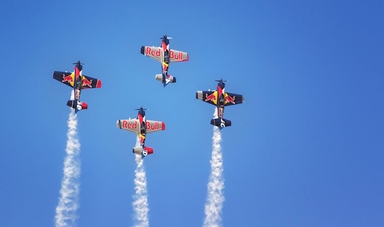Loading component...
At a glance
Elite sportspeople reach the top through technical skill and practice – and a positive attitude that fuels their desire to aim higher.
Red Bull has taken inspiration from its work with elite athletes and is translating these learnings into the operations of its business.
“We are using proven methods of driving the performance of our teams and to help our colleagues be at their best every day,” says Tomasz Nowakowski, vice president – finance, Red Bull Distribution Company.
“When we say ‘high-performance teams’, we don’t mean any special kind of structure or membership. Our approach is based on making the existing teams across the organisation as effective, efficient and focused on achievement as possible.”
Looking for mindset
Nowakowski says many companies are not gaining the efficiencies and productivity levels they hope for from their teams because their focus and resources are not invested in the right places. Even the most advanced tools and systems tend to fail if the underlying processes do not work as designed, and even the best processes will fail if people responsible for them do not perform their work with integrity.
For Red Bull, everything starts at the recruitment stage. Technical skills and relevant functional experience are important, but the right attitude is really the key.
“We look for diversity of thought. New ideas and approaches are crucial for responding to long-term challenges. Where we look for cohesion is around our leadership code and values, which are professionalism, responsibility, passion and focus,” he says. “We expect that everyone we hire embraces those core values. Authenticity is at the heart of our leadership code, and that facilitates people being more direct with each other.”
Positive teams
Team leaders are encouraged to assume positive intent and not take themselves too seriously. That reduces many misunderstandings and helps the faster resolution of internal conflicts.
Another concept embraced by Nowakowski’s team is “Shin Gi Tai”, which comes from Eastern philosophy and is followed by many martial arts practitioners. It represents a unity of shin (mind), gi (skill) and tai (body).
“I was first introduced to it when we had a training session at Machida Karate Academy in Los Angeles,” he explains.
“We learned that having the highest level of skill or the best technique is usually not enough to win consistently. Our body needs to be taken care of well. The competitor must be healthy and adequately conditioned in order to be able to use their skills. In the end it is strong mind and spirit that will drive the fighter to keep pushing and never give up.”
Translating this into the workplace means showing employees how to take care of their health and physical wellbeing. Nowakowski connects this to the strong mindset and grit that the company seeks and expects from its people. These qualities are also fostered through the company’s senior management, who are expected to lead by example.
Dealing with adversity
Of course, there are always unexpected setbacks. The issue is how the organisation and its people respond to them.
There is an important concept Nowakowski learned from one of world’s leading experts in this field, Dr Eric Potterat, called “adversity tolerance tactics”. Human beings often respond to setbacks or highly stressful situations with a primal fight or flight mechanism. This makes them lose conscious control over their performance.
Everyone has a way of dealing with adversity, but there is no single method that can guarantee that people can continue performing at a high level after a major failure or disappointment. Nowakowski says: “I learned from Potterat that high-performing teams, such as special forces and professional sports teams, tend to use sets of multiple tactics.
These range from pre-performance and post-performance routines, meditation and visualisation, to more advanced tools such as compartmentalisation and a very high degree of self-awareness.”
He believes that by knowing, combining and understanding these tactics, people can begin to incorporate them into their personal battles, which will improve performance, step by step.
Results on the board
Nowakowski believes that the company’s approach to team building underpins the speed with which it has been able to take over energy drink sales and distribution in new markets in the US.
“Many of our expansions would not be remotely possible in the timeline they happened in if our teams did not operate with growth mindset. It’s almost in our DNA right now,” he emphasises.
“Red Bull is not just a consumer packaged goods company, but also a powerful brand involved in the media world and in various global sports, including football, Formula 1, MotoGP, World Rally Championship and many others. The brand is our asset, and it has been our teams and the culture we have developed that have driven it forward.”

